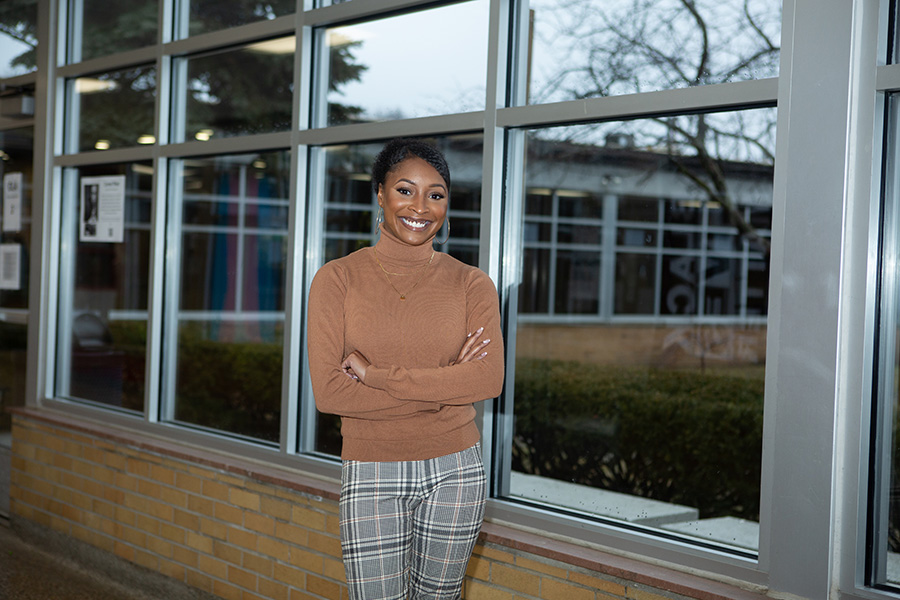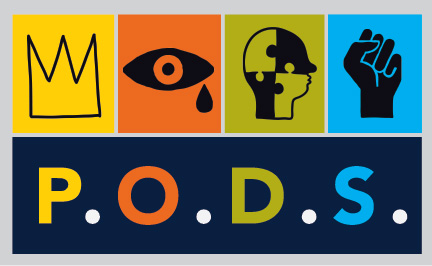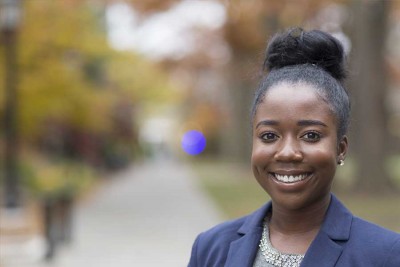
Sharonda Chaney, MSW '18, shares her story and brings us into the hallways of Washtenaw International Highschool and Middle Academy.
Watch the video.
Children, Youth, and Families
The Children, Youth, and Families (formerly Welfare of Children & Families) pathway prepares students to support children, adolescents, and adults through evidence-based and developmentally appropriate interventions and strategies that improve their lives. Students acquire a full range of individual, family, group and community intervention strategies and practice skills used with, and on behalf of, children and families.
The coursework covers topics including evidence-informed assessment and interventions, trauma, resilience, child and adolescent development, and prevention and promotion. Students will gain practice experience in child and family-serving clinics and agencies, mental health settings, schools, child welfare, health care, and youth development programs.
Careers
Child and family social workers are employed in a variety of settings, where they utilize skills to engage, assess, and intervene with children and their families. This pathway can result in a social work license to practice clinical social work, including both interpersonal practice and macro practice. Employment of social workers specializing in providing services to children and families is projected to grow 14 percent from 2016 to 2026, faster than the average for all occupations.
Potential careers include:
- Case Manager/Supervisor
- Child Welfare Worker, including Foster Care, Adoption, Kinship Care Workers
- Child, Youth, or Family Therapist
- Forensic Social Worker
- Home-based Therapist
- Infant/Child Mental Health Specialist or Therapist
- Interdisciplinary Legal Advocacy in Criminal Justice, Immigration, Child Advocacy, and Family Defense
- Medical Social Worker
- Probation Officer - Juvenile Justice
- Program Coordinator
- Refugee Social Worker
- School Social Worker
- Youth Development Professional/Coordinator
Field Experience
In the MSW program, some of the most important learning occurs outside of the classroom. Field placement is a supervised internship at an organization that provides the hands-on, real-world training portion of the curriculum.
Field placements might include:
- Behavioral Health Centers and Clinics
- Child Guidance Clinics
- Child Welfare Agencies
- Early Childhood Centers
- Government Agencies
- Healthcare Settings, including Hospitals
- Juvenile Justice Agencies
- Outpatient Clinics
- Schools
- Youth Mentorship Programs
Program Details
Children, Youth, and Families Pathway Course Requirements
Essentials
- SW505: Engaging Social Justice, Diversity, and Oppression in Social Work, 3 credits
- SW506: Essentials of Interpersonal Practice, 4 credits
- SW507: Research Basics for Social Work Practice, 1 credits
- SW508: Essentials of Social Welfare Policy, 3 credits
- SW509: Essentials of Community and Organizational Practice, 3 credits
- SW590: Introduction to Social Work Practice, 1 credits
- SW649: Practicing Policy with Current Events, 1 credits
- SW678: Program Evaluation and Applied Research, 3 credits
- SW699: Social Work Capstone, 1 credits
Pathway Requirement
- SW621: Culturally Responsive and Evidence-Informed Assessment with Children, Youth, and Families, 3 credits
- SW630: Contexts of Life-course Development: Childhood, Adolescence, and Early Adulthood, 3 credits
Pathway Requirement (choose one)
- SW622: Child and Family Well-Being - Micro Practice, 3 credits
- SW623: Child and Family Well-Being - Macro Practice, 3 credits
Please see course planning worksheets for a full list of courses associated with this pathway.
Competencies for Children, Youth, and Families
University of Michigan's School of Social Work (U-M SSW) is accredited by the Commission on Accreditation (COA), of the Council on Social Work Education (CSWE). Accreditation is a system of recognizing educational programs as having a level of performance and quality that gain them the confidence of the educational community and the public. You can read more about the Educational Policy and Accreditation Standards here.
At U-M SSW, each pathway has specialized competencies that describe the knowledge, values, skills, and cognitive and affective processes that comprise the competency in each pathway area.
1. Demonstrate Ethical and Professional Behavior
Social workers demonstrate the ability to apply ethical social work principles and critical thinking to products and work produced. Social workers understand the role of emotional intelligence and professional resilience in professional and ethical practice. Social workers understand the role of other professionals when engaged in interprofessional teams within their areas of specialization. Social workers recognize the importance of life-long learning and ways that supervision and consultation can support continued development.
Practice Behaviors:
- Utilize supervision and consultation to guide professional decision-making.
- Demonstrate emotional intelligence in practice and professional situations.
- Utilize effective communication strategies appropriate to context.
2. Engage Diversity and Difference in Practice
Social workers examine and apply perspectives on life-course development in relation to critical life conditions, life events, and psychological and physical functioning. They will acquire skills to engage client systems and assess and intervene with diverse groups and populations. Special attention in assessment and practice courses will be given to addressing diversity in the context of helping relationships and engaging differences in order to promote coping and resilience. Content will cover diverse and intersecting factors, including race, ethnicity, socio-economic status, gender, sexual orientation, sexual identity, and culture.
Practice Behaviors:
- Apply knowledge of life-course development, coping, and resilience
- Integrate knowledge pertaining to differences in race, ethnicity, socio-economic status, gender, sexual orientation, sexual identity, and culture
3. Advance Human Rights and Social, Economic, and Environmental Justice
Social workers understand that all children and families regardless of position in society has fundamental human rights such as freedom, safety, privacy, an adequate standard of living, health care, and education. Students understand the ways in which oppression and human rights violations affect children in schools, child welfare, and juvenile justice. Students understand strategies designed to eliminate oppressive structural barriers to ensure that children and families’ rights are protected and that social goods, rights, and responsibilities are distributed equitably.
Practice Behaviors:
- Apply their understanding of social, economic, and environmental justice to advocate for children and families at the individual and system levels
- Engage in practices that advance social, economic, and environmental justice.
4. Engage in Practice-informed Research and Research-informed Practice
Courses will integrate theory, research, and practice to deepen students’ understanding of evidence-based and research-informed prevention and intervention strategies. Social workers learn methods to monitor and evaluate interventions for efficacy and sensitivity to diverse and intersecting factors, including race, ethnicity, socio-economic status, gender, sexual orientation, sexual identity, and culture.
Practice Behaviors:
- Apply current research to practice
- Participate in disseminating and sharing research and evaluation findings
5. Engage in Policy Practice
Social workers understand how to analyze, formulate, and advocate for policies that advance human rights and social, economic, and/or environmental justice through the application of critical thinking skills. Social workers are able to identify how current events are linked to policy issues, how to critically analyze and understand policy implications, and apply strategies to engage in policy practice that effect change and advocate for clients.
Practice Behaviors:
- Identify how current events are linked to policy issues impacting clients and client systems.
- Analyze the implications of policy across service systems.
- Identify strategies to engage with policy to advocate for clients and client systems.
6. Engage with Individuals, Families, Groups, Organizations, and Communities
Courses will use assessment to select culturally responsive and evidence-informed prevention and intervention strategies. Social workers develop advanced intervention skills needed to work with children, adolescents, families, and service systems; and to implementing evidence-based practices that are compatible with developmental life stages, family or caretaker goals, needs, circumstances, culture, and values.
Practice Behaviors:
- Demonstrate skills in assessment and intervention relevant to stages and contexts of life-course development
- Demonstrate skills in assessment and intervention that are culturally responsive
- Identify gaps in knowledge relevant to assessment and intervention in specialized settings
7. Assess Individuals, Families, Groups, Organizations, and Communities
Social workers develop knowledge and skills in assessment focused on children, youth, families, and organizations. They will learn about various approaches to assessment; the contexts in which assessment takes place; the strengths and limitations of assessment tools; and their application in school settings, juvenile justice, and child welfare. Additionally, Social workers learn how to conduct developmental assessments in order to make determinations about child, youth and family service needs. Social workers also examine historical child welfare policy development; gaps in service delivery; and factors contributing to the over-representation of children and youth of color in service systems.
Practice Behaviors:
- Apply skills in advanced assessment to inform practice decisions at the individual, family, group, and organizational levels
- Know how to assess the strengths and limitations of specific assessment tools and approaches
8. Intervene with Individuals, Families, Groups, Organizations, and Communities
Social workers learn about socially just and culturally sensitive policies, programs, and practices within the context of child welfare and child-serving organizational contexts. They will explore a range of evidence-based interventions that build on strengths and resources of children and their families at all levels of the social ecology, while also considering issues of diversity and equity in access to, and use of, available services. Social workers learn about efforts to engage communities in the policy and service delivery process through a variety of mechanisms including community partnerships, coalitions, and systems of care. Content on intervention planning will assist students in selecting interventions that are matched to client problems across diverse populations, cultural backgrounds, socio-political contexts, and available resources. Courses will prepare students to assess and intervene with organizations and social service systems to enhance the delivery of developmentally tailored and culturally-sensitive prevention, intervention, and rehabilitative services for children, youth, and families.
Practice Behaviors:
- Review, select, and apply evidence-based practices and approaches in prevention and intervention involving individuals, families, groups, and organizations
9. Evaluate Practice with Individuals, Families, Groups, Organizations, and Communities
Social workers learn skills in evaluation suited to programs and practices for children, youth and families. They will develop knowledge about methods of evaluation and the inherent challenges of evaluating practices in complex environments. Social workers acquire skills to assess, monitor, and evaluate programs and practices “in context” and engage in efforts to assess changes at the individual, interpersonal, and organizational levels.
Practice Behaviors:
- Apply skills in evaluation across practice settings
- Apply skills to assess, monitor, and evaluate programs and practices “in context”
The graduate courses listed below have been taken by previous MSW students or have been identified as being of possible interest to students in this pathway and can be taken to fulfill Pathway Required Electives. On the course planning worksheet, information regarding Pathway Required Electives is included.
There are many other courses not listed below that may be of interest and may also meet the elective requirement. If you identify a pathway-related course not listed below that you want to take to meet your Pathway Required Electives (rather than simply an elective), please contact the Technical Advisors ([email protected]) for approval.
Interest in courses numbered below 500 should be checked for graduate-level status since many are offered for undergraduate credit only. You can check this by contacting the department offering the course or contacting the SSW registrar ([email protected]).
In addition, some courses may be restricted, require prerequisites, not be open to social work students, and/or require instructor permission. If you encounter problems registering for these courses, please contact the department offering the course. The SSW registrar will not be able to assist with registration in outside courses because these courses are not offered by the SSW.
The courses listed below are offered in various semesters. To see if a course is offered in the term you are interested please check the SSW list of outside courses, the website of the department offering the course, or the Wolverine Access Class Search page.
If you want to use one of these non-School of Social Work courses to fulfill the Children, Youth, and Families Required Electives (SWrCW), you will need to fill out a course substitution to receive approval. In the "Rationale for Substitution" box you should reference this page.
Anthropology - Cultural
- ANTHRCUL 558 - Current Issues in Sociocultural Anthropology
Health Behavior & Health Education
- HBEHED 660 - Theory, Research and Practice in Adolescent Health
Law
- LAW 673 - Family Law
Psychology
- PSYCH 473 - Developmental Disturbances of Childhood
- PSYCH 501 - Special Problems in Psychology as a Social Science
- PSYCH 757 - Seminar: Socialization of the Child
- PSYCH 770 - Family Therapy
- PSYCH 877 - Psychopathology through the Lifespan I.
Learn More About Social Work
Student Profiles
Student Profile
Tyhesia Simpson-Van Beek
Tyhesia Simpson-Van Beek was born in Chicago and lived there until the age of seven. She spent the next four years in foster care, sometimes suffering abuse. She finally settled in with permanent adoptive parents in Iowa at age eleven. Tyhesia and her two siblings were fortunate. Their initial foster placements separated them, but Tyhesia’s new parents were willing to adopt all three children, and the family was reunited.
Matriculating at George Washington University in Washington, DC, Tyhesia thought she would become a psychologist. “But I took psych courses and thought there was too much focus on the brain and not enough on social interaction,” she says. “I told a career counselor I wanted to inspire and empower children to be contributing members of society and eliminate the stresses minority children face in social service systems.” The counselor suggested Tyhesia major in Human Services and Social Justice.
“My interest was based on lived experience,” Tyhesia points out. “Because I was foster child and was adopted, I struggled with my identity in a family of a different race, but my faith and passion helped me through.” Personal experience also motivates Tyhesia’s interest in service provision. “In high school, I provided meals and hosted events for the elderly,” she recalls. “My family volunteered through our church. I was always active in service-oriented activities and I enjoyed volunteering.” In college, her service learning requirement included working with her church, keeping kids involved during summers, and serving as a teaching assistant in a DC elementary school. Studying abroad in a suburb of Cape Town in South Africa, Tyhesia helped a project to promote entrepreneurship in tourism with the goal of providing financial resources for the community.
At that time, Tyhesia was also contemplating graduate school. She returned from South Africa, and found that the U-M School of Social Work had sent her information. “When I saw they had a child welfare scholarship,” she says, “I knew that’s what I wanted to do. I saw all the opportunities they had to offer—plus they were number one!” She grins. “When someone knows you graduated from Michigan, it levels you up. I thought, “Why not go to best place that will give me the knowledge to address tough issues, develop skills and pursue my career goals?”
Tyhesia describes her goals: “The first step is to become a licensed clinical social worker, then in two years I want to be in private practice. I want to do research and write a book on the realities of adoption. I want to start my own nonprofit to address child welfare issues innovatively, so a family has multiple needs met in one place. Further down the line I also want to do political work.”
Of the impact of her Sims Endowed Award, Tyhesia says, “The greatest thing was being able to have financial stability. I can focus on my program and put my best self forward. A scholarship like Sims helps students like me get the education they need to make a difference.”



